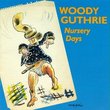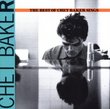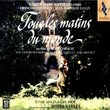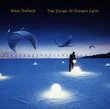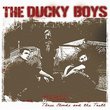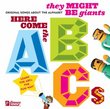| All Artists: Franz Schubert, John Mark Ainsley, Maarten Koningsberger, Graham Johnson, Christine Schäfer, Patricia Rozario, Catherine Denley, Paul Agnew, Ian Bostridge, Jamie MacDougall, Simon Keenlyside, Michael George, The London Schubert Chorale, Stephen Layton Title: The Hyperion Schubert Edition 28 - An 1822 Schubertiad / Ainsley, Koningsberger Members Wishing: 1 Total Copies: 0 Label: Hyperion UK Release Date: 7/8/1997 Album Type: Import Genres: Pop, Classical Styles: Vocal Pop, Opera & Classical Vocal Number of Discs: 1 SwapaCD Credits: 1 UPC: 034571130286 |
Search - Franz Schubert, John Mark Ainsley, Maarten Koningsberger :: The Hyperion Schubert Edition 28 - An 1822 Schubertiad / Ainsley, Koningsberger
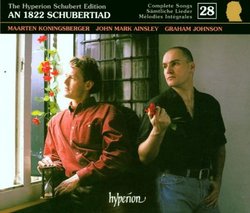 | Franz Schubert, John Mark Ainsley, Maarten Koningsberger The Hyperion Schubert Edition 28 - An 1822 Schubertiad / Ainsley, Koningsberger Genres: Pop, Classical
Volume 28 of Hyperion's unique project to record all of Schubert's 600-plus songs takes us back to the wonderful year 1822, and a Schubert evening ("Schubertiad") that features quite a few songs about love and death, not n... more » |
Larger Image |
CD DetailsSynopsis
Amazon.com Volume 28 of Hyperion's unique project to record all of Schubert's 600-plus songs takes us back to the wonderful year 1822, and a Schubert evening ("Schubertiad") that features quite a few songs about love and death, not necessarily in that order. Assisting tenor John Mark Ainsley and pianist Graham Johnson are baritone Maarten Koningsberger, sopranos Christine Schäfer and Patricia Rozario, and a large cast of series "regulars," including the London Schubert Chorale in the songs with chorus parts. What a way to kill an evening! --David Hurwitz Similarly Requested CDs
|
CD ReviewsAn 1822 Schubertiad Melanie Eskenazi | Cheam UK | 08/05/2000 (5 out of 5 stars) "Schubert: an 1822 SchubertiadThis disc contains some of Schubert's most - loved music, including settings of Goethe such as the incomparable "Der Musensohn," the unjustly neglected "Im Gegenwärtigen Vergangenes" and the adorable "Geheimes," and many of the performances amongst the 22 tracks do full justice to these miraculous songs. However, some listeners will be puzzled as to why our introduction to the baritone Maarten Koningsberger should be so lengthy, since he is given no fewer than ten songs here, including some of the most familiar in the repertoire - puzzled, because, although his voice is soft and pleasant to the ear, it lacks any special distinction and, for this listener, had the effect of sending me back to Fischer-Dieskau with renewed admiration, especially for "Am Flusse" and "An die Entfernte." Amongst the many very fine performances here, two stand out - Christine Schäfer's "Der Musensohn" and John Mark Ainsley's "Geheimes. " The former is ideally youthful, sung with lovely tone and Schäfer's characteristic attention to words, and Graham Johnson's playing is perfectly judged; he writes that Schubert intended this song to "excite the listener with its irrepressible gaiety" and this is exactly what he achieves. Johnson writes brilliantly about "Geheimes;" - describing this music as "suggestive as a wink, and as delicate as a blush," he tells us that he knows people who, to his distress, "laugh out loud" at Peter Pears' recording of it. I have to confess to being one of those who tend to blush with embarrassment at some versions of this perfect little song, but the present version induces only admiration and the desire to hear it again and again. To quote Johnson again, "the word - setting alone is a miracle of inventiveness," and Ainsley does it full justice. He conveys that characteristic Schubertian hesitancy sweetly yet without a trace of archness - there is something ingenuous about his voice, so that, whilst he cannot resist just a hint of a lisp at "bedeute," he is able to convince us of his eagerness and rapture, and his phrasing and diction in the last line "Ihm die nächste süsse Stunde" with its lovely stress on "süsse" is utterly captivating.Koningsberger is most successful in "Sei mir gegrüsst!" where he manages to hold the listener's attention throughout the lover's many protestations, and in "Du liebst mich nicht" where he evokes the desperation and hopelessness of the speaker without crossing the line into over-acting. The following track is "Todesmusik" which is, to me, one of Schubert's finest songs; sadly, Koningsberger is not really up to either the intense drama or the technical demands here, and this rendition cannot be compared to that of Fischer-Dieskau. The same is true of "Wilkommen und Abschied" which Ainsley sings with plenty of testosterone but, unusually for him, the phrasing is rather hectic and the words seem mostly indefinite in their emphasis, although he does rise to the occasion at "Ich hofft es, ich verdient' es nicht" with its characteristically heartfelt emphasis on "verdient." Modified rapture, then, but still deserving 5 stars."
|

 Track Listings (22) - Disc #1
Track Listings (22) - Disc #1